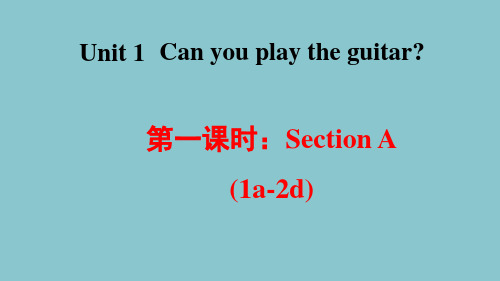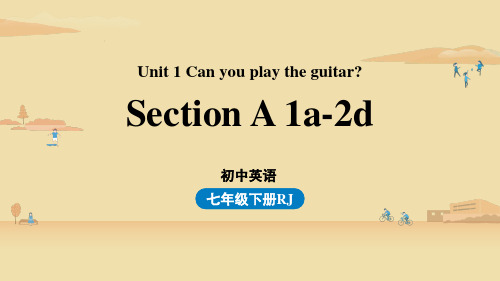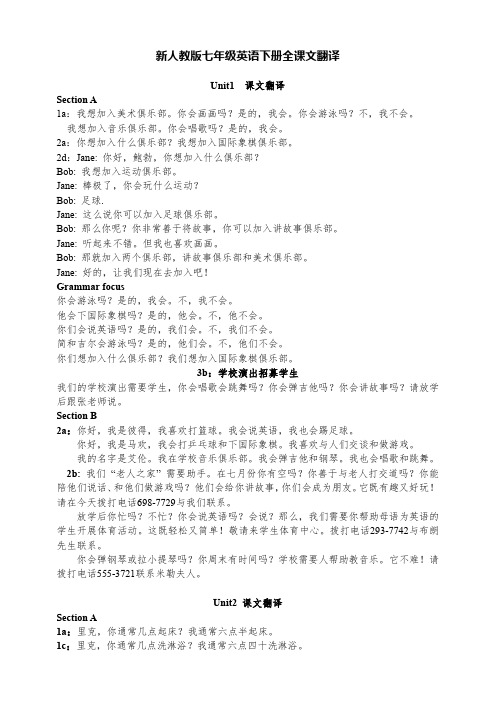人教版英语七年级(下册)Unit 11 Section A (1a-2b) 教案
七年级英语下册Unit 1 Section A (1a-2d)

2b
Section A2b.wav
Listen again. Complete the sentences.
1. Lisa wants to join the _______ chess club, but she can’t play
_______. chess
2. Bob wants to join the ________ English club. He likes to speak
知识点
3 join/dʒɔɪn/v.参加;加入
考向一【易错点】join 指参加某个组织或加入某个团 体并成为其中一员;join 还有“(将两物) 连接,结合”之意 eg: I want to join the chess club. 我想加入国际象棋俱乐部。
拓展1 join sb.(for sth.)意为“加入某人/和某人( 做某事)”。 eg: Come and join us. 来加入我们吧。 拓展2 join sb.in (doing) sth.意为“加入到某人的某一活动中”。 eg: He’ll join us in singing the song. 他将和我们一起唱这首歌。 魔法 记忆
考向二 【易错点】play 用作不及物动词时,如果后跟宾
语,则要加介词with。宾语是物时,表示“玩耍
某物”;宾语是人时,表示“与某人玩”。 eg: Dolphins can play with the ball. 海豚会玩球。
Lin Zhiying likes to play with his children when
pictures.
dance
play the guitar
sing
1a
Language Goal:Talk about abilities What can these people do? Match the activities with the people. g 1.sing ______ 2.swim ______ e
人教版七年级下册英语Unit1第1课时(SectionA 1a-2d)-最新

B: Oh, can you ˈsing?
A: ˈYes, I ˈcan. 2 A: Can you ˈswim?
want等词要重 读哦
B: ˈNo, I ˈcan’t.
3 A: I ˈwant to ˈjoin the ˈart ˈclub.
B: Can you ˈdraw? A: ˈYes, I ˈcan.
3. Sentences: ①Can you swim? —Yes, I can. /No, I can’t. ②What can you do? —I can dance./I can’t sing. ③What club do you want to join?—I want to join a/the
Unit 1 Can you play the guitar?
Section A 1a-2d
初中英语 七年级下册RJ
Learning goals
1. New words: guitar, chess, club, story, sing, swim, dance, draw, speak, join, tell 2. Expressions: play chess, speak English, be good at, play the guitar, join a club
play+球类运动/ 棋牌类名词
play soccer/football 踢足球 play volleyball 打排球
play Chinese chess下中国象棋
(2) play与乐器类名词连用,表示“演奏,弹奏, 吹奏”,此时名词前加定冠词the。
play the + 乐器 类名词
play the guitar 弹吉他 play the piano 弹钢琴 play the violin 拉小提琴 play the drums 敲鼓
2023年人教版初中英语七年级Unit 1 Section A (1a-2d) 教学设计

2023年人教版初中英语七年级Unit 1 My name’s Gina.一、单元教材分析本单元围绕“结交新朋友”使学生学会打招呼和介绍自己、询问他人姓名的基本句型:“What’s your/his/her name?My/His/Her name is …”; 通过学习区分"First/last name”,了解有关姓名的文化知识;通过查询电话号码“What’s your/her/his phone number?”,学习数字1~9,同时也进一步促进学生之间的相互了解;通过以上几个方面的学习,使学生在轻松、愉快的学习氛围中熟识新伙伴。
本单元与第二单元衔接紧密:由课堂内的打招呼、自我介绍到课外、校外相互了解。
由特殊疑问句的学习到一般疑问句的学习,使学生将书本知识运用到实际生活中。
二、单元学情分析本单元的主题是熟识新伙伴,同时引导学生采用Practicing, Listening for specific information和Role playing的学习策略,学习一些新词汇,掌握一些重点句型,在小组合作学习的过程中,进一步促进学生之间的相互了解。
三、单元教学建议本单元可综合运用讲授式、启发式、自主学习、合作学习等各种策略,提供大量的学习资源,通过老师向学生进行的自我介绍,同学自我介绍传句子比赛,自我查资料表演,自制明信片等的活动,使学生能够学到知识,又增加了他们的学习的乐趣。
来培养学生的自主学习的能力及表达能力和逻辑思维能力。
采用Practicing, Listening for specific information和Role playing的学习策略,利用教学图片或制作多媒体课件来展开课堂Pair work, Group work的口语交际活动,询问他人姓名、查询电话号码,了解有关姓名的文化知识。
四、单元课时分配本单元可用4课时完成教学任务:Section A (1a-2d) 用1课时Section A (Grammar Focus-3c) 用1课时Section B (1a-2c) 用1课时Section B (3a-Self Check) 用1课时Section A 1 (1a-2d)一、教学目标:1. 语言知识目标:1) 能掌握以下单词: name nice meet his and her your能掌握以下句型:①—Hi. My name’s Gina.—I’m Jenny. Nice to meet you!②—What’s your/his/her name?—My/his her name is…③—Are you…?—Yes, I am. / No, I'm not.④—Is he/she…?—Yes, she/he is. / No, she/he isn’t.2) 能了解以下语法:your, his, her等形容词性物主代词的简单用法;What’s=what is I’m=I am name’s=name is等缩写形式。
2023【人教版】七年级英语下册教学课件-第1课时(A 1a-2d) (3)

Section A 1a-2d
R·七年级下册
Learning objects
By the end of the class, you will be able to … 1. Learn curriculum words and useful expressions. 2. Describe the weather and describe what people
2c Talk about the people in 2a with a partner.
What’s Uncle Joe doing? He’s playing basketball.
What’s Jeff doing?
He’s playing computer
…
games. What’ห้องสมุดไป่ตู้ … doing?
Jim: What’s Uncle Joe doing? Linda: He’s playing basketball.
Jim: Is Aunt Sally there? Linda: Yes, she is, but she’s busy right now.
Jim: What’s she doing? Linda: She’s cooking.
Make a story according to the pictures.
This is Uncle Joe’s family. It’s 6:00 p.m. Uncle Joe’s family are doing different things. Uncle Joe is … Aunt Sally is …
Listen and choose
七下第11单元2b课文原文

七下第11单元2b课文原文Our school life is really wonderful. We have classesin the morning and in the afternoon. After school, we play sports and do some after-school activities. On weekdays, we have many subjects. Maths, Chinese, English, P.E., Musicand Science are our subjects. Sometimes we have art lessons, too. We have science experiments, which are very interesting. We usually play games and sing songs after class. On weekends, we often have more free time. We can watch TV, play computer games or go out to play with our friends. Sometimes we go to the park or the beach. We also have some sports activities, like football or basketball games. We are very happy at school because we have a good time with our friends and teachers. We like our school life very much. 标题:My Favorite Subject 正文:My favorite subject is science because I love science experiments and the teacher is really good. She teaches us to observenature and we get to use some simple scientific equipmentto conduct experiments and study science facts. It's very interesting and exciting for me because it lets me learnnew things every day and explore more about the worldaround me. In addition, the subject also provides opportunities for group work and discussions, which helps me improve my communication skills and team spirit.。
新人教版七年级英语下册全课文翻译(修改版)

新人教版七年级英语下册全课文翻译Unit1 课文翻译Section A1a:我想加入美术俱乐部。
你会画画吗?是的,我会。
你会游泳吗?不,我不会。
我想加入音乐俱乐部。
你会唱歌吗?是的,我会。
2a:你想加入什么俱乐部?我想加入国际象棋俱乐部。
2d:Jane: 你好,鲍勃,你想加入什么俱乐部?Bob: 我想加入运动俱乐部。
Jane: 棒极了,你会玩什么运动?Bob: 足球.Jane: 这么说你可以加入足球俱乐部。
Bob: 那么你呢?你非常善于将故事,你可以加入讲故事俱乐部。
Jane: 听起来不错。
但我也喜欢画画。
Bob: 那就加入两个俱乐部,讲故事俱乐部和美术俱乐部。
Jane: 好的,让我们现在去加入吧!Grammar focus你会游泳吗?是的,我会。
不,我不会。
他会下国际象棋吗?是的,他会。
不,他不会。
你们会说英语吗?是的,我们会。
不,我们不会。
简和吉尔会游泳吗?是的,他们会。
不,他们不会。
你们想加入什么俱乐部?我们想加入国际象棋俱乐部。
3b:学校演出招募学生我们的学校演出需要学生,你会唱歌会跳舞吗?你会弹吉他吗?你会讲故事吗?请放学后跟张老师说。
Section B2a:你好,我是彼得,我喜欢打篮球。
我会说英语,我也会踢足球。
你好,我是马欢,我会打乒乓球和下国际象棋。
我喜欢与人们交谈和做游戏。
我的名字是艾伦。
我在学校音乐俱乐部。
我会弹吉他和钢琴。
我也会唱歌和跳舞。
2b: 我们“老人之家” 需要助手。
在七月份你有空吗?你善于与老人打交道吗?你能陪他们说话、和他们做游戏吗?他们会给你讲故事,你们会成为朋友。
它既有趣又好玩!请在今天拨打电话698-7729与我们联系。
放学后你忙吗?不忙?你会说英语吗?会说?那么,我们需要你帮助母语为英语的学生开展体育活动。
这既轻松又简单!敬请来学生体育中心。
拨打电话293-7742与布朗先生联系。
你会弹钢琴或拉小提琴吗?你周末有时间吗?学校需要人帮助教音乐。
它不难!请拨打电话555-3721联系米勒夫人。
七年级-人教版-英语-下册-Unit-2-Section-A-(1a-2d)
brush teeth (刷牙) eat breakfast (吃早饭) take a shower (洗淋浴)
up adv. get up dress v./n. get dressed brush v./n. tooth n. shower n.&v./n. take a shower
S: From twelve o’clock at night to six o’clock in the morning. I: What time do you usually get up? S: At eight thirty at night. Then I eat breakfast at nine. I: That’s a funny time for breakfast! S: Yeah. After that, I usually exercise at about ten twenty. I: When do you go to work? S: At eleven o’clock, so I’m never late for work.
Daily activities get up
brush one’s teeth/take a shower eat breakfast get dressed go to school
Time 6:30 6:40 7:00 7:20 7:30
Observe (观察) the picture and the table and talk.
Name Bob Mary Jack Jim Anna Time 5:30
2a Listen to the conversation and complete the sentences.
人教版七年级英语下册Unit10_Section_A(1a-2d)名师教案
Unit10 Section A(1a-2d)名师教案【教材版本与册数】新目标人教版七年级下册【单元名称】Unit 10 I’d like some noodles.【课时】Section A1a-2d(第1课时)【课型】Listening and speaking(听说课)附:教学活动设计步骤过程措施(教师活动与学生活动)目的持续性评价1预备与激活先期知识Step 1Greeting andLeading in(2mins)Show a picture and let the students answer the questionsbelow:1)Can you see three bowls?2)What are in them?3) Do you like noodles?4)Can you find the differences among the three bowls ofnoodles?通过图片引入话题,并通过提问引入课时单词学习。
部分学生能说出“noodles”,少部分学生能说出“beef noodles”。
2获取新知识Step 2Pre-listening(3mins)1. Teach the new words of food used in noodles.2. Look at the numbered list of ingredients. Read andrepeat.3. Ask students to match each word with the foods in 1a.4. Present the countable and uncountable nouns.5.List many words, and let the students discuss in groupsand tell us what kinds of nouns these words are.Ss practice in pairs like this:A: What kind of noodles would you like?B: I’d like beef and tomato noodles, please.A: What size bowl of noodles would you like?为1b的听力作铺垫准备和搭支架,这样通过直观图片和单词匹配的方式,能让学生更容易记住这些食物名称,也为后面的听说活动扫清了一部分词汇障碍。
Unit 11 How was your school trip人教版新目标七年级下册英语优秀教学设计 初一教案有教学反思
UNIT11 How was your school trip?Section A 第1课时(1a〜1c)自主学习方案1.自学生词,并记住拼读及拼写。
2.预习课本找出重点短语及句子。
(见学案自学导练内容)3.读记后完成自学导练内容。
课堂导学方案Step1 情景导入Teacher:We had a school trip last week. Did you have a good time? How was your school trip?Students : Not bad/Pretty good/Great/Terrible.Teacher :Did you take any photos?Did you feed chickens?What did you do?Please tell us what you did. Do you want to know what Carol did?环节说明:以上周的校游为话题,引出一般过去时态,简洁明了,直奔主题。
Step 2完成教材1a-1c的任务1.认真观察图片,将图片和la中所给的短语匹配。
集体核对答案,完成la。
(2分钟)2.教师领读la中的词组,学生跟读并且识记,然后两人一组互相提问。
以小组为单位总结动词过去式的构成规则,教师补充点拨。
(5分钟)3.大声朗读图片中的小对话,提前感知听力内容。
(2分钟)4.认真听录音,圈出Carol在校游时所做的事情,集体核对答案,完成lb的听力任务。
(3分钟)5.练习lc中的对话,并请学生表演。
(2分钟)6.模仿lc中的对话,利用la中的图片信息,两人一组来谈论Carol在校游时所做的事情,邀请几组学生来表演对话。
(4分钟)参考案例:A:Did Carol take any photos?B:Yes,she did. /No,she didn’t.7.小结训练。
(4分钟)(1)— What did Sam do on the farm?—He B chickens.A feedsB fedC grows(2)— C you to the zoo last Sunday?—No,I didn'.A. Do;goB. Are;going C . Did;go环节说明:听说结合,第一时间向学生传达语言目标,结对对话练习和小结训练,使语言目标得以强化。
人教版七年级下册英语课件:Unit 11 How was your school trip_Section A(1a-2d) (共39张PPT)
Eric: I weRntefaisdhitnhgeevceorny vdeary.sAatnidonI fed the chickens waigthaimny, tghraenndpfial.lI_it_nw_a_tsh_s_eo_m__u_c_h_f_u_n. Peter: Soubnldasngkosodb.He_lo_ow_w_w_.a_s_t_h_e_w__ea_t_h_e_r_th_e_r_e?
4. Did Eric watch the stars at night? Yes, he did.
2d P62
L1ine.tRg’rosoleusppeslea; ywthhe iccohnvegrrsoatuiopn 2. Rodleopelsaytthhee cboensvetr.sation
A: Did he _ri_d_e__a_h_o_r_s_e last weekend? B: Yes, he did.
2a Listen and check ( ) the questions you hear. P62
___ What did the farmer say? ___ Did you grow any apples? ___ What did you see? ___ Do they grow apples? ___ Did you learn anything? ___ Did you eat them? ___ Did you ask him any questions? ___ Were they good?
1. How was Eric’s trip last week? It was excellent.
- 1、下载文档前请自行甄别文档内容的完整性,平台不提供额外的编辑、内容补充、找答案等附加服务。
- 2、"仅部分预览"的文档,不可在线预览部分如存在完整性等问题,可反馈申请退款(可完整预览的文档不适用该条件!)。
- 3、如文档侵犯您的权益,请联系客服反馈,我们会尽快为您处理(人工客服工作时间:9:00-18:30)。
opinions
Part5 Speaking Summary
Homework
1’ 2’+2’ 2’+4’ (10’-11’)
1’
5. Discuss
and retell
1. Ask Ss to brainstorm 1. Brainstorm 1. To lead Ss to realize
about the meaning of taking 2.
《课标》还强调学习过程,重视语言学习的实践性和应用性,鼓励学生在教师的指导下,通过
体验、实践、参与、探究和合作等方式,发现语言规律,逐步掌握语言知识和技能,不断调整
情感态度,形成有效的学习策略,发展自主学习能力。
2. 2015 年,《教育部关于全面深化课程改革落实立德树人根本任务的意见》中提出“核心素养体
their speaking
3. Ask Ss to report about 3.
Report
their trips.
about their trips
1. Summarize what have Recall and To reflect on what've
been learnt in this class.
系”,其中英语学科核心素养包括语言能力、文化品格、思维品质和学习能力四个方面。本堂
课围绕“农场旅行”展开大量的听说,让学生感知语言和运用语言,将乡村、农场和旅行文化
融入课堂,引领学生思考,并通过大量的语言输入来让学生感悟过去式的使用。将知识学习与
技能发展融入主题、语境、语篇和语用之中,促进文化理解和思维品质形成,引导学生学会学
3. Ask students to check
phrases
answers by reporting
4. imitate and role play
Part 4 Listening 2
(2a-2b) and speaking
2’ 2’ 2’ 2’ 7’
(14’-15’)
1.Play the record and ask Ss
(Practice) interview--report
Summary
教学环节
时间 2’
Part 1 Warming up
Part 2 Preparing words for listening
2+2+1 (5’)
Part 3 Listening 1 (1b) and speaking
1’ 2’ 2’ 3’ (8’-9’)
attention to the theme
3. Ask students to think
of this class
about their experience on a
farm
1.Show pictures in 1a and 1. Do 1a
To prepare new words
ask students to guess
to do 2a-2b
1. Do 1a-1b
1. To
practice
listening and to
2. Ask Ss to imitate the 2.Read after the
record sentence by sentence record
3. Ask Ss to underline
attract Ss attention to the use of past tense
教学用具:多媒体(PPT、打开视频、图片、播放器)、教案、板书、学案、猜词、电子笔、照片
附录: P94 SectionA 2a, 2b tapescripts Bob : So, Carol , was the farmer nice? Carol : Yes, he was very friendly , and he showed us around the farm. Bob : Really? What did you see? Carol: We saw a lot of interesting things and we learned a lot from him about farming. Bob: That is great! Did you ask him any question? Carol: Yes, I asked him if the farmer grew strawberries. Bob: Do they ? Carol: Yes, they do. They grow them from December to June. Bob: And apples? Do they grow apples? Carol: Yes, they do. They pick the apples around September. Bob: Did you pick any strawberries? Carol: Yes, we did . And we took some home, too! Bob: Oh, wow! Were they good? Carol: They were delicious!
四、教学重点和难点 教学重点:农场活动的词汇、关于旅行经历的交际用语。 教学难点:动词过去式的理解和运用。
五、教学流程
(Warm up) free talk
(1a) prepare for new words
(1b) listen 1--discuss--report--role-play
(2b) listen 2--imitate--read-discuss--retell
2. Read and act
2.lead students to memorize
the phrases by acting while
reading
1. Ask students to listen to 1. Listen and 1. To practice listening
do 1b
do 1b
Introduce or make a dialogue about your trip (to the farm) and record it.
Notes on the blackboard
Topic: How was your school trip?
What did she do?
Past tense
接联系,尽量消除中文对英文的影响。由于本堂课学生是第一次接触过去式,所以将选用最简单版
的猜词 PK 赛。
课堂可能出现的问题: 有些学生过于活跃,在小组合作活动过程中或者互动环节(小组讨论,小组展示和组内互评等
活动),可能会过于兴奋,要常加督促。
三、教学目标 通过话题的输入和情境中的活动,对乡村和农场生活有一定的了解和兴趣; 掌握一定的与主题相关的词汇,并知道描写过去的事情要将动词变成过去式; 感知乡村和农场的丰富精彩,思考旅行的意义,并能初步进行相关话题的交际。
the fun and meaning of
a trip.
Interview(1 to the trip to the farm
2. Ask Ss to interview(1 to the class and 1 2. To help Ss practice
the class and 1 in groups) . in groups) .
六、教学过程
教师活动
学生活动
设计意图
1. show picture
1. See pictures To get students warmed
2. Ask " What were they? 2. Think and up and draw their
And what did they do? "
answer
课题:
七年级下册 Unit 11 How was your school trip?
课型: Listening and speaking 时间
授课老师
一、指导思想和理论依据
1. 2011 年《课标》:七年级学生要达到三级听说水平,即能听懂熟悉话题的语段和故事;能利用
图片、文字等提示描述一件事情,能提供关于个人情况和经历的信息,能讲述小故事等。
the past tense
3. Read and 2. To create chances
4.Lead Ss to summarize the underline
for Ss to practice
rules
speaking
5. Ask Ss to discuss and 4.
Share
retell
习,指向核心素养培养。同时关注学生的交际能力,从“以知识为本”转变为“以技能为纲”。
3. 以目标为导向,利用建构主义思想。建构主义强调学习者的主动性,认为学习是学习者基于原
有的知识经验生成意义、建构理解的过程,而这一过程常常是在社会文化互动中完成的。建构
主义主张教师主导、学生主体;教师是意义建构的帮助者、促进者;学生是信息加工的主体、
rode a se.
milked a cow.
She fed chickens.
took some photos.
went for a walk.
talked with a farmer.
(showed us around.
saw a lot.
learned about farming.
took them home.)
式。所以比较陌生,学习难度比较大。所以本堂课要让学生有足够的输入和操练,通过多次实践活
动来感知过去式。本堂课授课内容为 SectionA 的 1a-2b,话题为“一次农场旅行”。 SectionA 1a 是
